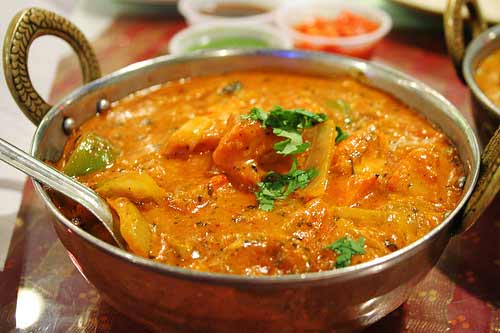Indian Food Recipes Biography
Source(google.com.pk)Petrina Verma Sarkar is an avid foodie and journalist. Born and bred in India, she has travelled her country extensively and sampled the varied and delicious dishes of its different regions. She learned to cook from her Mother, Grandmothers and various Aunts and loves to experiment with spice combinations in her own kitchen.
Experience:
As a journalist, Petrina has years of experience writing on lifestyle subjects ranging from food to interior design and beauty to fashion. She has written about Indian food for About.com, for almost four years.
By Petrina Verma Sarkar:
Several lifetimes are not enough to discover and sample all the delights of Indian cuisine! It is the glorious result of thousands of years of evolution and assimilation! Like all things Indian, it has absorbed various influences from other cultures but managed to make them uniquely its own. It is exotic, sometimes complex and always delicious! Love Indian food or just curious about it? This is the place to be no matter what your level of interest or experience. Join me as we explore the delectable depths of Indian cuisine!
What is organic food, anyway?
Though organic food can be produced with certain synthetic ingredients, it must adhere to specific standards regulated by the United States Department of Agriculture (USDA). Crops are generally grown without synthetic pesticides, artificial fertilizers, irradiation (a form of radiation used to kill bacteria), or biotechnology. Animals on organic farms eat organically grown feed, aren't confined 100 percent of the time (as they sometimes are on conventional farms), and are raised without antibiotics or synthetic growth hormones.
Is organic food better for me?
Organic foods may have higher nutritional value than conventional food, according to some research. The reason: In the absence of pesticides and fertilizers, plants boost their production of the phytochemicals (vitamins and antioxidants) that strengthen their resistance to bugs and weeds. Some studies have linked pesticides in our food to everything from headaches to cancer to birth defects — but many experts maintain that the levels in conventional food are safe for most healthy adults. Even low-level pesticide exposure, however, can be significantly more toxic for fetuses and children (due to their less-developed immune systems) and for pregnant women (it puts added strain on their already taxed organs), according to a report by the National Academy of Sciences.
Pesticide contamination isn't as much of a concern in meats and dairy products (animals may consume some pesticides, depending on their diet), but many scientists are concerned about the antibiotics being given to most farm animals: Many are the same antibiotics humans rely on, and overuse of these drugs has already enabled bacteria to develop resistance to them, rendering them less effective in fighting infection, says Chuck Benbrook, Ph.D., chief scientist at the Organic Center, a nonprofit research organization.
Is buying organic better for the environment?
Organic farming reduces pollutants in groundwater and creates richer soil that aids plant growth while reducing erosion, according to the Organic Trade Association. It also decreases pesticides that can end up in your drinking glass; in some cities, pesticides in tap water have been measured at unsafe levels for weeks at a time, according to an analysis performed by the Environmental Working Group (EWG). (To find out about the safety of your tap water, visit the EWG website at ewg.org/tapwater/yourwater.) Plus, organic farming used 50 percent less energy than conventional farming methods in one 15-year study.
Manjula Jain was born in North India into a vegetarian family. Her mother was an excellent cook who paid attention to every detail. One of the most important details for her was cooking with fresh ingredients. As a child and young adult, she helped her mother in the kitchen. Manjula learned to cook with just a few spices and herbs in order not to compromise the taste of the vegetables, grains and lentils.
After Manjula Jain got married and moved to the United States from India in the late 1960s, her family remained vegetarian because of their adherence to the Jain religion. One of the main principles of the Jain religion is the belief in non-violence to all living beings and the belief to “live and let live”. Manjula Jain is passionate about this way of life today.
Indian Food Recipes Food Recipes for Dinner For Kds with Pictures In Urdu Desserts Pinoy In Hindi in Sinhala Language for Kids to Make in Sri Lanka
Indian Food Recipes Food Recipes for Dinner For Kds with Pictures In Urdu Desserts Pinoy In Hindi in Sinhala Language for Kids to Make in Sri Lanka
Indian Food Recipes Food Recipes for Dinner For Kds with Pictures In Urdu Desserts Pinoy In Hindi in Sinhala Language for Kids to Make in Sri Lanka
Indian Food Recipes Food Recipes for Dinner For Kds with Pictures In Urdu Desserts Pinoy In Hindi in Sinhala Language for Kids to Make in Sri Lanka
Indian Food Recipes Food Recipes for Dinner For Kds with Pictures In Urdu Desserts Pinoy In Hindi in Sinhala Language for Kids to Make in Sri Lanka
Indian Food Recipes Food Recipes for Dinner For Kds with Pictures In Urdu Desserts Pinoy In Hindi in Sinhala Language for Kids to Make in Sri Lanka
Indian Food Recipes Food Recipes for Dinner For Kds with Pictures In Urdu Desserts Pinoy In Hindi in Sinhala Language for Kids to Make in Sri Lanka
Indian Food Recipes Food Recipes for Dinner For Kds with Pictures In Urdu Desserts Pinoy In Hindi in Sinhala Language for Kids to Make in Sri Lanka

No comments:
Post a Comment